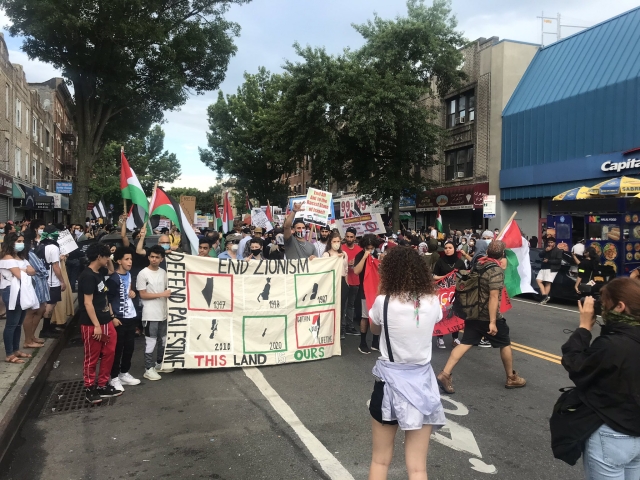In recent years, Palestinian activism has frequently employed three keywords that have resonated with a global audience of sympathizers: "Apartheid", "Oppression", and "Two-State Solution". While there's no denying the efficacy of these terms in advocating for Palestinian statehood, logically, they seem to be at odds with each other. Addressing one, when they're used in conjunction, seems impossible. This observation has deeper implications, ones that many Israelis recognize: The ultimate triumph of Palestinian activism could lead to the end of Israel and a third wave of Diaspora Jewry, often accompanied by significant strife.
First, let's delve into the term "Apartheid". The Cambridge Dictionary defines apartheid (when not referencing the South African situation) as "a system of keeping groups of people separate and treating them differently, especially when this results in disadvantage for one group." When viewed through the lens of the Israeli-Palestinian conflict, labeling Israel as an apartheid state suggests the erroneous belief that there's a monolithic group of Israeli citizens, with a marginalized "Palestinian" subgroup that faces regular discrimination.
Mohammed El-Kurd admits on the @LexFridman podcast that his comparison of Israel to Hitler was not a good "strategy" (not that he regrets spreading that lie). It's the same as when he admitted that when he calls Israel an apartheid state, it is also about strategy, not truth. pic.twitter.com/9iLTSvgRzb
— Canary Mission (@canarymission) August 3, 2023
The notion stated in the latter makes it seem as if the only thing Israel must do to solve the conflict is give these unequally treated Palestinians full rights, which completely undermines the second keyword to be discussed: The Two-State Solution. The Palestinian movement has been pushing for independent Arab statehood since its foundation. In other words, they are in fact not seeking equal treatment under the laws of the State of Israel, but are, if anything, separatists who strive for an independent set of laws for their people; in that case, apartheid cannot be claimed just as much as it is not claimed by Swiss nationals complaining of a lack of rights on Italian soil. In fact, one can argue that the physical elements of existing apartheid, such as concrete walls and autonomous guarded territory allocated for the group under these apartheid rules, is exactly what a group seeking sovereignty would want and view as a step in the right direction.
“We don’t want two states, we want all of it.”
— Jordyn (@JordynTilchen) April 22, 2022
Funny, because I don’t recall seeing photos of any of you burning Jordanian flags at the Jordanian embassy. Just the Israeli one.
How… convenient.
Moving on to "Oppression". The Collins Dictionary describes it as "the cruel or unfair treatment of a group of people." For oppression to truly exist, the oppressor must exert dominance over the oppressed. In areas like Judea, Samaria, and Gaza, groups such as the Palestinian Authority, Hamas, or the Islamic Jihad primarily rule. Within these territories, marked by Israel's security barriers, there's a clear distinction between local governance and Israel's alleged oppression. The entities with the most direct influence over Palestinians are their own governing bodies. The Israeli Defense Forces (IDF) typically step in only when unrest impacts Israeli civilians.
The Palestinians have their own government: Hamas governs Gaza, and the Palestinian Authority governs the West Bank. They oppress their people and steal the foreign aid money, then pay for propaganda to blame Israel. https://t.co/0eEsYSpire
— Subjugated Reader (@lhertzkafka) July 29, 2023
Having analyzed these pivotal terms in Palestinian activism, a synthesized demand surfaces: Achieve total sovereignty and end oppression by establishing a recognized Palestinian state, while also securing full citizenship rights within any remaining Israeli territories.
Their set of demands, which on paper all sound reasonable and justified, only work when they have full rights over every single inch of what is now the State of Israel, with or without the West Bank; which means the destruction of a Zionist state both in its current form and in any other borderlines it once had. Now even if you are reading this from an anti-Jewish self-determination point of view, you surely have the understanding that from the way most Israelis see it, there is no choice but to oppose Palestinian activism with its current demands, for their success means Israel’s demise.


